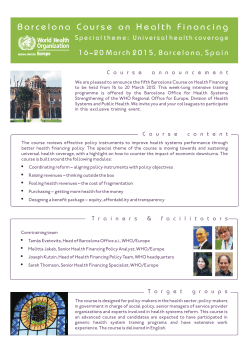
Flagship course on health systems strengthening
FLAGSHIP COURSE ON HEALTH SYSTEMS STRENGTHENING FOCUS ON NON-COMMUNICABLE DISEASES 27 April-1 May, 2015, Barcelona, Spain C o u r s e a n n o u n c e m e n t We are pleased to announce the 11th Flagship Course on Health Systems Strengthening to be held in Barcelona, Spain from 27 April to 1 May 2015. This five-day training program is offered by the WHO Regional Office for Europe in collaboration with the Health Policy Analysis Center of Kyrgyzstan. The course will be hosted by the WHO Barcelona Office for Health Systems Strengthening. The course is open to both English and Russian speaking participants with all presentations simultaneously translated from English to Russian and all course materials available in both languages. C o r e t r a i n e r s Rifat Atun, Professor of Global Health Systems, Harvard T.H. Chan School of Public Health Tamás Evetovits, Head of Office a.i., WHO Barcelona Office for Health Systems Strengthening Melitta Jakab, Senior Health Financing Policy Analyst, WHO Barcelona Office for Health Systems Strengthening Sarah Thomson, Senior Health Financing Specialist, WHO Barcelona Office for Health Systems Strengthening In addition to the core trainers, invited experts will share good practices from Europe C o u r s e c o n t e n t This week-long intensive and interactive course takes a systematic approach to health system strengthening in order to better address the growing burden of non-communicable diseases. Integrating theory and practice, the course tackles a number of key topics such as: 4assessing health system performance including progress on NCD outcomes towards the 2025 targets including equity dimensions; 4systematically diagnosing determinants of health system performance; 4reviewing regional trends in the coverage of core NCD interventions and services with a focus on options to scale up individual health services for cardiovascular disease, diabetes, and cancer; 4tackling health system challenges through effective policies such as making priority setting more explicit in line with health system goals, empowering the population to become front-line workers in managing their chronic conditions, strengthening the models of care for early detection and proactive management of NCDs, ensuring better continuity and coordination across providers, and aligning incentives with desired service delivery solutions, etc. 4Learning from good practice experiences in Europe through two “Good Practice Roundtables”; 4carrying out an own country exercise. T a r g e t g r o u p s The course is open to all 53 Member States of the WHO European Region. The target group of the course is government officials at national and regional levels from ministries of health and health insurance funds, from ministries of economies and finance, representatives of academic institutions, representatives of international organizations and NGO's, and health service providers in the public and private sectors. The course will be delivered in English with simultaneous translation to Russian. T u i t i o n f e e Tuition fee for the course is EURO 700. This fee includes tuition, course materials, internet access, lunches and coffeebreaks. Participants (or their funding agency) will be responsible to cover the costs of travel, accommodation and subsistence while in Barcelona. Hotels will be arranged close to the venue. D e a d l i n e To secure a place, applicants must submit a completed application form and return it no later than 20 March 2015. Acceptance decision will be communicated to all applicants by 23 March 2015. V i s a If appropriate, applicants are responsible for obtaining a visa. Formal invitation and visa support letter from WHO will be provided. Please note that obtaining a visa may require several weeks; early application is advised. V e n u e The course will be held in one of the buildings of the complex of the Hospital de Sant Pau, one of the most outstanding examples of Modernist architecture in Barcelona. Besides being a point of reference in terms of the heritage and culture of Barcelona, the extent of the historical complex’s impact stretches not only to Europe but also to the rest of the world. Owing to the uniqueness of its construction and its artistic beauty, the whole hospital complex was declared Historical Artistic Monument in 1978 and World Cultural Heritage Site by UNESCO in 1997. . C o n t a c t Should you require any further information, please contact Aida Abdraimova or Asel Dunganova by phone: (996-312) 666-244; 660-998. Please, send your completed applications by e-mail: aida@hpac.kg, asel@hpac.kg or through fax: (996-312) 663649.
© Copyright 2025





















